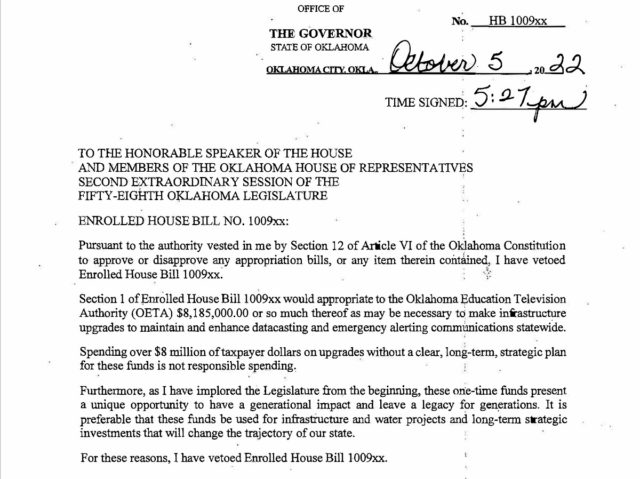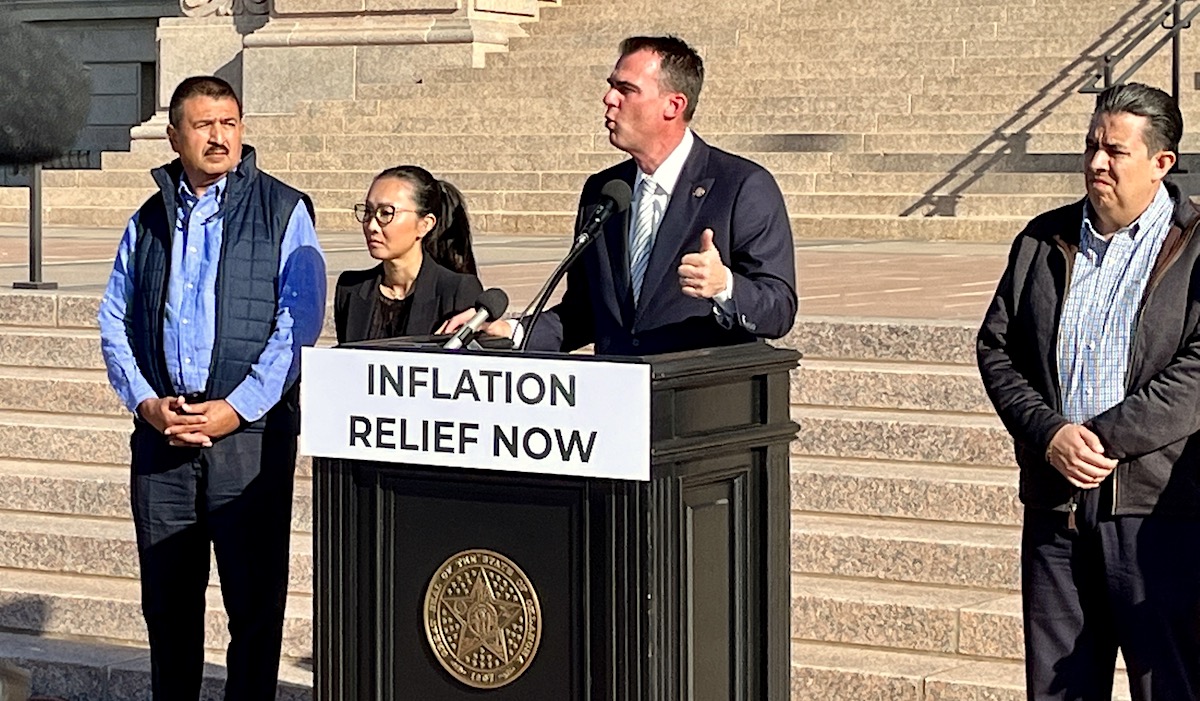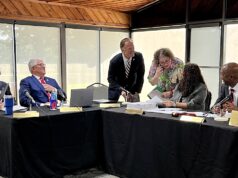

Oklahoma Gov. Kevin Stitt signed a number of bills that came out of the Legislature’s special session to appropriate American Rescue Plan Act funds, vetoed three, and allowed a slew of others to enter into law without his signature.
The three vetoed bills earmarked funds for the Oklahoma Arts Council, the state’s Department of Emergency Management and Homeland Security and the Oklahoma Education Television Authority.
In his veto messages dated Wednesday, the governor questioned the “long-term, strategic value” of each of the three appropriations he vetoed.
Meanwhile, the approved measures will send more than $1 billion to infrastructure projects, workforce development, health-related programs, youth services and the military and veterans.
“It is my hope that these one-time funds will help us move the needle in integral areas like improving crumbling infrastructure, addressing the opioid epidemic, and expanding broadband services across Oklahoma to get us closer to becoming a top-10 state,” Stitt said in his press release.
Senator: ‘He didn’t learn much about the projects’

The Legislature can override any of the vetoes with two-thirds support of both chambers, but it is unknown whether lawmakers will reconvene to do so before their own established date to adjourn special session Oct. 14.
Asked for reactions to Stitt’s three vetoes, representatives for House Speaker Charles McCall (R-Atoka) and Senate President Pro Tempore Greg Treat (R-OKC) provided no comment Thursday. On Friday afternoon, however, Treat released a statement.
“There is a productive dialogue ongoing with caucus members regarding the vetoes,” Treat said. “Once we come to a resolution as to whether or not we want to come back to special session, or handle the legislation in regular session, we will make it public.”
House Appropriation and Budget Chairman Kevin Wallace (R-Wellston) declined to comment on whether he wanted to pursue veto overrides.
“That’s a decision for the speaker and the pro temp’s offices,” he said.
Wallace said that between the appropriations vetoed by Stitt and other unallocated ARPA funding, about $214 million remains from the federal relief act. Stitt has repeatedly asked the Legislature to provide “real” inflation relief to Oklahoma families by eliminating the state portion of the sales tax on groceries. Both chambers have previously advanced versions of that proposal before, but Treat told media it’s off the table this fall until a Senate working group can make a broader proposal on tax reform in the spring.
“It is an election cycle. There’s a lot of people on the ballot in November. The ARPA money did not go anywhere — even with the vetoes,” Wallace said. “The education and workforce development group still had more than $80 million that was not allocated. There’s still work to be done, and we can take all of it up next February.”
Sen. Julia Kirt (D-OK) questioned Stitt’s basis for the three vetoes.
“I’m disappointed,” she said. “To imply that those are not strategic projects means that he didn’t learn much about the projects.”
The three vetoed bills together appropriated a little more than $24 million:
- HB1009XX would give $8.19 million to OETA to “make infrastructure upgrades to maintain and enhance datacasting and emergency alerting communications statewide”;
- HB1015XX would dedicate $6 million to the Oklahoma Department of Emergency Management and Homeland Security to “construct nine regionally located emergency operations centers to assist with the distribution of personal protective equipment, disinfectant, and other supplies for first responders, public employees, and schools responding to emergency conditions”;
- SB18XX would appropriate $10 million to the Oklahoma Arts Council to “address the negative economic impacts of the pandemic by providing assistance to impacted nonprofit organizations.”
Kirt, a former director of Oklahomans for the Arts, argued that the money directed toward the Arts Council, though not directly related to infrastructure, would be a strategic investment.
“That proposal was worked out over several years, so it was strategic and well thought out,” she said, “and the arts are an incredibly important part of diversifying out economy.”
More ARPA appropriations coming
Among the bills that received the governor’s signature were some of the largest appropriations, including $550 million for broadband expansion, $110 million toward fighting the opioid and obesity epidemics and expanding rural telehealth, and $125 million for mental health care.
Earlier this week, the governor also signed SB 3XX, a controversial measure that appropriates more than $100 million for projects at OU Health, with the condition that the health center not provide gender-affirming care for minors, unless those minors were born with specific chromosomal disorders.
As Wallace noted, the Legislature still has more ARPA money left to appropriate before Dec. 31, 2024, the deadline for using the federal funds. Of the $1.87 billion allocated to the state, almost $200 million was not earmarked during the Legislature’s brief special session last week.
Among the likely recipients of those funds is the Department of Human Services, which was slated to receive $95 million during the special session to contract with nonprofits on a number of projects.
The allocation stalled out when legislators couldn’t agree whether $2.8 million should be dedicated to the YWCA in Oklahoma City or a statewide network representing at least 25 organizations whose purpose is to prevent and eliminate sexual and domestic violence.
Leaders from both chambers said they intend to revisit the issue next year.
The full list of bills signed by the governor includes:
The following bills passed into law without the governor’s signature:
- HB 1010XX
- HB 1014XX
- HB 1016XX
- HB 1017XX
- HB 1018XX
- HB 1019XX
- HB 1021XX
- HB 1022XX
- SB 4XX
- SB 5XX
- SB 6XX
- SB 8XX
- SB 9XX
- SB 10XX
- SB 11XX
- SB 13XX
- SB 16XX
- SB 17XX
- SB 19XX
- SB 20XX
- SB 21XX
(Update: This article was updated at 2:10 p.m. Friday, Oct. 7, to include comment from Treat.)




















